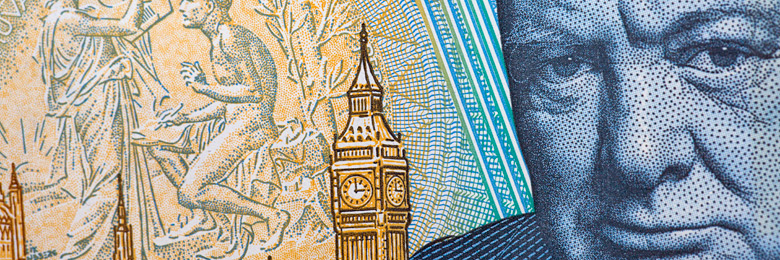No More Champagne


–Kristi Kuechler, President, FOX Private Investor Center
From the May 19, 2017 issue of Grant’s Interest Rate Observer
‘No More Champagne’
David Lough’s wonderful, engrossing, nightmarish study of Winston Churchill’s reverse Midas touch (Picador, 2015) inspires our old friend Michael Harkins, chief of Levy, Harkins & Co., to draw a monetary and investment lesson.
No More Champagne, written by a former banker who knows his money, chronicles the long-running calamity of Churchill’s personal finances in the context of the parallel disaster of the British pound. At the heading of each chapter is the sterling/dollar exchange rate and a rough-and-ready translation of historical purchasing power into contemporary money. “The book has 28 chapters, each with its own exchange rate,” Harkins observes, “and never an uptick in the lot.”
“He may have been the man of the century,” Harkins goes on, in reference to Lough’s political hero and financial antihero, “but he went through most of it astonishingly broke. Because he lived till the age of 90, only dying in 1965, his accounts are a remarkable testimony to what inflation can do over a long lifetime.”
Churchill’s losses in the American 1929 stock market constitute a handy observation point for this multigenerational debasement. In the year of the Crash, the dollar/pound exchange rate stood at roughly $5/£1. So Churchill’s $75,000 drawdown worked out to £15,000. To translate those gold pounds into today’s paper pounds, multiply by an inflation factor of 50, which gets you £750,000.
“Think about that for a moment,” says Harkins, “particularly if you are good with scientific notation. It takes all the brain power you can bring to work out how much money that really is. Then consider that the pound is worth about $1.25 as we write, not $5 as then, and Britain floated 40-year debt in the last quarter at 1¾%.”
There are innumerable books on how to manage your money. Here might be the best book on how to mismanage it. Born in Blenheim Palace, Churchill was exposed early to the appearance of money, though not to its substance. Young Winston seems not to have noticed the distinction. His spending shocked even his impecunious mother, Jennie Jerome. “You do get through it in the most rapid manner,” she told the 14-year-old future chancellor of the exchequer after he applied to her for another infusion of funds.
Churchill received prodigious sums for his writing and speaking. His literary strength and stamina will astonish writer and non-writer alike. He looked his deadlines straight in the eye, meeting some, missing others but never seeming to allow them to make inroads on life’s pleasures. No workload staggered him.
As much as he earned, he persistently spent more: on his estate at Chartwell; on gambling, books, servants, tuitions, equities, currencies, drinking, eating; in general, on living the way one ought to live, if only one had Churchill’s liver. Unwell in the early 1930s, Lough relates, Churchill “moved for several weeks to a London nursing home which was conveniently close to Buck’s Club, allowing the regular delivery of oysters and champagne at lunchtime.”
“No more champagne is to be bought,” Churchill commanded his family and servants at Chartwell in 1926, at a moment when he was especially broke. “Unless special directions are given only white or red wine, or whisky and soda will be offered at luncheon, or dinner. The Wine Book is to be shown to me every week. No more port is to be opened without special instructions. Cigars must be reduced to four a day. None should be put on the table; but only produced out of my case.” It didn’t last.
From time to time, Winston and his wife, Clementine, would come into some money. Once, a fortuitous train accident provided them with a £56,000 inheritance. Clementine exulted: “I can’t describe the blessed feeling of relief that we need never be worried about money again (except thro’ our own fault of course!). It is like floating in a bath of cream.”
The Churchills shortly resumed sinking. Publisher’s checks, trust-fund invasions, bank overdrafts, miscellaneous loans and (especially) the kindness of friends and even near-strangers sustained them. In May 1940, as Hitler very nearly administered his coup de grâce to the British cause, Churchill was “running out of money to pay his household bills or his tax or the interest on his large overdraft, which was due at the end of the month.”
As an investor, Churchill was partial to margin debt, short time horizons, active trading and impetuous decision-making. Such an approach served him no better than it has ever done for anyone else. Anticipating the contemporary hedge-fund titan Bruce Kovner, who, in the 1970s, would send to JFK Airport to get the early-arriving edition of the Financial Times, Churchill would have copies of the New York Herald delivered to Chartwell by rail and taxi when he was embarked on American speculations. He had the winning conviction in mid-1932 that the post-Crash bear market was ending and that America was not, after all, going out of business. He presciently wrote on July 28, at very nearly the bottom: “The risk of investments in America now is incomparably less than it was a year ago.”
Lough relates: “Churchill made his move in late July and early August, when he sold the U.S. Treasury bonds he had bought in March, emptied his New York bank account and used the $12,000 thus raised to buy $20,000 worth of shares (he borrowed the balance from brokers). The new investment policy lasted a month before Churchill abandoned it.”
Churchill was born, in 1874, into a Victorian world of convertible currencies and nominal tax rates. He took his leave from a world, in 1965, of fiat currencies and towering marginal tax rates (in Britain they had risen as high as 97.5%). Still, he managed, somehow, to die with an estate published as £304,044 before tax. At his death, Lough relates, “Madame Odette Pol-Roger in France instructed that a black band of mourning be placed around the label of her family’s champagne.”
To see the full agenda for the 2017 FOX Autumn Global Investment Forum, click here.